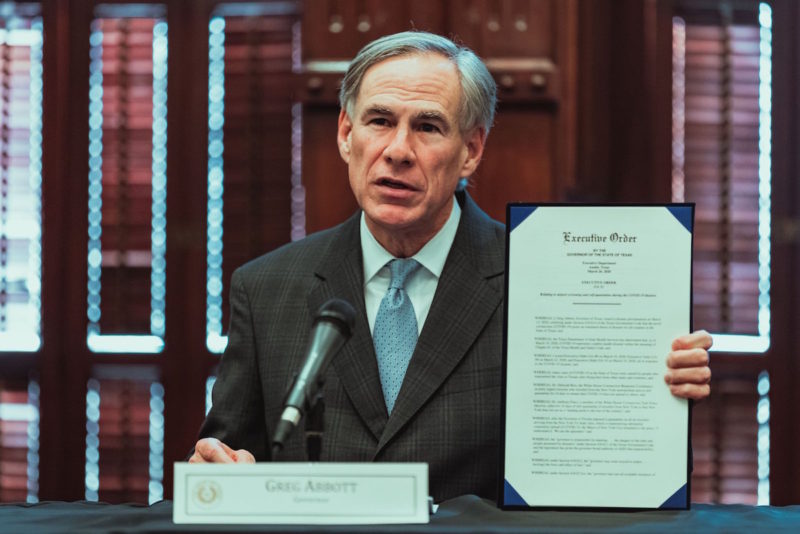The Texas Governor and Texas Attorney General acted Sunday to preempt local governments from releasing inmates from jails in order to reduce the risk of COVID-19 in the criminal justice system.
The Harris County Sheriff’s Office said Sunday that it confirmed its first case of an inmate with COVID-19, while some 30 others have shown symptoms.
In Harris County, Travis County, and elsewhere, Democrat-run local governments have sought to reduce the risk to jail populations by bringing in fewer arrestees and releasing mostly non-violent offenders.
But state officials thought that the jail releases were going too far, and they feared that local governments might broaden their release criteria as the health situation in jails potentially worsens in the days ahead.
The governor stated, “Several counties are now reportedly considering the broad-scale release of arrested or jailed individuals.”
Attorney General Ken Paxton said in a statement, “Just over a week ago, a Harris County judge released a murder suspect on bond because the suspect claimed he feared contracting COVID-19 in jail. Now Harris County is working with prisoner plaintiffs in a federal case to intentionally release thousands of more suspects on personal recognizance bonds.”
“Harris County refuses to defend its citizens against the proposed mass, unmonitored release of felons.”
That federal lawsuit, if successful, would result in the release of “over 4,000 dangerous individuals in Harris County,” Paxton claimed. On Sunday he filed a brief in the U.S. District Court for Southern Texas, seeking to take over the handling of the case from Harris County, the defendant. “Local officials… cannot represent the State’s interests,” he wrote.
Paxton’s brief says that Harris County defense lawyers are seeking “the release of thousands of persons arrested on felony charges—including murder, rape, burglary, and domestic violence… (their) motion asks for the release of any person arrested for a felony offense without limit to the type of offense.”
Separately, the Texas Governor acted by executive order to attempt to halt the jail releases. His order still allows for the release of certain non-violent offenders, but likely will force local governments to reassess the release criteria that they have been using.
Under the Texas Disaster Act of 1975, the governor has the power to suspend the provisions of any “regulatory statute” and he also “may issue executive orders hav[ing] the force and effect of law.”
In his executive order, he claimed that these provisions give him the power to suspend articles of the Texas Code of Criminal Procedure.
He wrote, “Article 17.03 of the Texas Code of Criminal Procedure, and all other relevant statutes and rules relating to personal bonds, are hereby suspended to the extent necessary to preclude the release on personal bond of any person previously convicted of a crime that involves physical violence or the threat of physical violence, or of any person currently arrested for such a crime that is supported by probable cause.”
Abbott added, “I hereby order that no authority should release on personal bond any person previously convicted of a crime that involves physical violence or the threat of physical violence, or any person currently arrested for such a crime that is supported by probable cause.”
He also suspended Article 15.21 and 17.51, which also relate to personal bonds, and Article 42.032, which allows the grant of commutation of time for good conduct, industry, or obedience.
Medical releases would still be permissible by court order on an “individualized basis,” provided that proper notice is given to the district attorney and an opportunity for hearing is given.
At a press conference, Abbott said, “We want to prevent the spread of COVID-19 among prison staff and inmates. But releasing dangerous criminals into the streets is not the right solution.”
Lawmaker: Abbott Exceeded His Powers
Rep. Joe Moody, the Speaker Pro Tempore of the Texas House of Representatives and a Democrat from El Paso, responded to Abbott’s order, saying, “The constitutions of the United States and the State of Texas are not ‘regulatory statutes’ that can be suspended on a whim.”
“If followed, this order will see jails bursting at the seams with minor drug offenders, homeless people whose most recent ‘crime’ was something like simple trespass, and everyday citizens picked up on the flimsiest of allegations that will eventually be dismissed after months locked up.”
Moody said he expects the executive order to be challenged in court, and noted that he would sign an amicus brief in support of the challenge.
Bail reformers also question the constitutionality of the order on the basis that those who have access to cash are still able to post bail and walk free, even if they have the same criminal history as someone who cannot.
As quoted in the Texas Tribune, Alec Karakatsanis, executive director of a Harris County bail reform group, said, “It is a dangerous, unprecedented, chaotic and flagrantly unconstitutional edict that if enforced would expose many people around the state of Texas to a public health catastrophe.”
On the other hand, Austin Police Association Vice President Justin Berry, a candidate for Texas House of Representatives, praised Abbott’s decision, saying it would “ensure that violent and dangerous criminals are not derelictly released back into our communities by the very people who took an oath to protect us.”
Berry has been speaking out about the risk that the coronavirus pandemic poses to domestic violence victims, saying that local governments should not take actions that offenders back in their homes. His remarks came in response to an Austin Public Safety Commissioner, Chris Harris, who said that “domestic violence will surely increase during the pandemic… but turning to criminalization will often not stop and could even increase that violence.”
Berry accused Harris of advocating for keeping domestic abusers with their victims. “I’ve taken and seen way too many battered spouses and sadly even had one who was later murdered by their partner,” he said.
